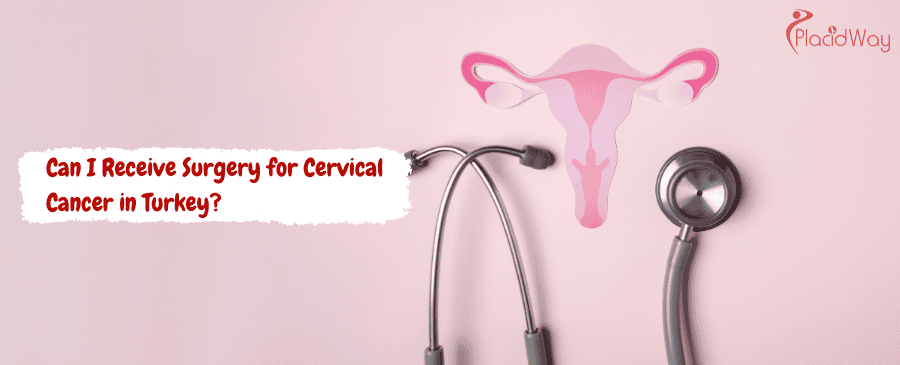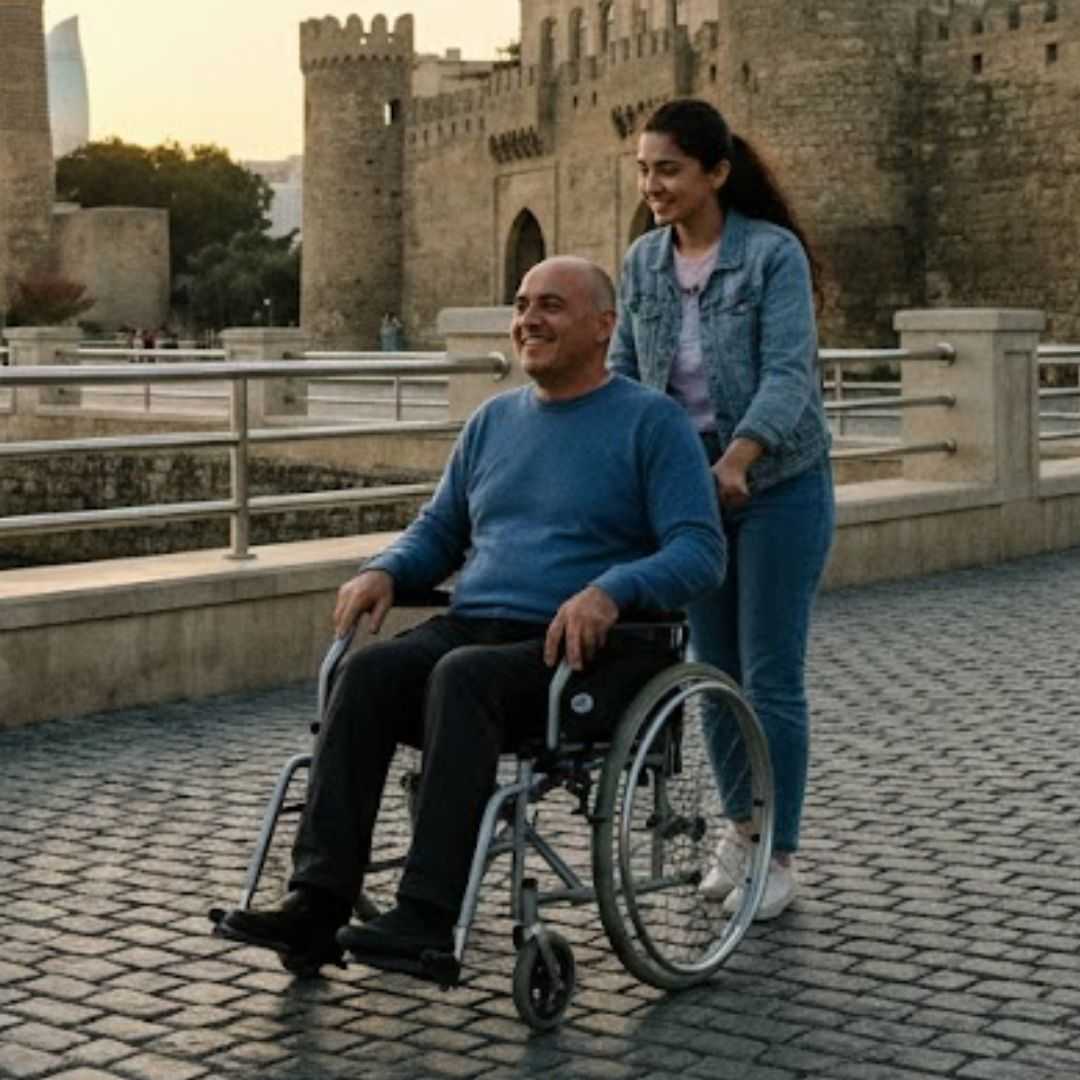Affordable Excellence: Cervical Cancer Surgery in Turkey
Turkey offers various cervical cancer surgeries, including conization radical trachelectomy simple hysterectomy radical hysterectomy, depending on the cancer stage and the patient's fertility preservation desires.Turkey's medical facilities are equipped to perform a wide array of surgical interventions for cervical cancer, tailored to the specific stage of the disease and the patient's individual needs.
Here are some of the common surgical procedures available:
-
Conization (Cone Biopsy):
-
This procedure involves removing a cone-shaped piece of tissue from the cervix, which contains the abnormal cells. It's typically used for very early-stage cervical cancer (micro-invasive cancer) or as a diagnostic and treatment procedure for precancerous lesions.
-
It's often performed with techniques like Loop Electrosurgical Excision Procedure (LEEP) or cold knife conization.
-
One of the key benefits of conization is that it can preserve fertility, making it a suitable option for women who wish to have children in the future.
-
-
Simple Hysterectomy:
-
A simple hysterectomy involves the removal of the uterus and cervix. This procedure is generally recommended for early-stage cervical cancer where the cancer has not spread beyond the cervix.
-
Unlike radical hysterectomy, it does not involve removing surrounding tissues or lymph nodes.
-
This surgery means a woman can no longer become pregnant.
-
-
Radical Trachelectomy:
-
This is a fertility-sparing surgery that involves removing the cervix, part of the vagina, and surrounding tissues, along with pelvic lymph nodes, but keeping the main part of the uterus.
-
It is an option for certain early-stage cervical cancers in women who still want to have children.
-
While it preserves fertility, careful monitoring is required during subsequent pregnancies due to potential risks.
-
-
Radical Hysterectomy (Wertheim-Meigs Operation):
-
This is a more extensive surgery that removes the uterus, cervix, surrounding tissues (parametrium), and often the upper part of the vagina. Pelvic lymph nodes are also typically removed during this procedure (pelvic lymph node dissection).
-
It's usually performed for more advanced early-stage cervical cancers (e.g., Stage IB1, IB2, IIA1) where the cancer has spread beyond the immediate cervix but is still localized to the pelvic region.
-
This surgery is curative for many women but results in the inability to carry a pregnancy.
-
-
Pelvic Exenteration:
-
In rare cases, for recurrent cervical cancer that has spread to nearby organs within the pelvis (like the bladder or rectum), a highly extensive surgery called pelvic exenteration might be considered. This involves removing the uterus, cervix, vagina, bladder, rectum, and often creation of new pathways for waste elimination.
-
This is a complex and life-altering procedure performed only in select cases when other treatments have failed.
-
Turkish hospitals often utilize advanced techniques such as laparoscopic surgery and robotic-assisted surgery for cervical cancer, which can lead to smaller incisions, less pain, faster recovery times, and improved cosmetic outcomes compared to traditional open surgery. The choice of surgery depends heavily on the stage and type of cervical cancer, as well as the patient's overall health and desire for future fertility.
What is the cost of cervical cancer surgery in Turkey?
One of the compelling reasons many international patients choose Turkey for medical treatments, including cervical cancer surgery, is the cost-effectiveness without compromising on quality.The prices are notably lower compared to countries in North America, Western Europe, and even some Asian nations.
Here's a general breakdown of costs:
-
Overall Treatment Cost: The total cervical cancer treatment cost in Turkey, which can include surgery, chemotherapy, and radiation therapy, often falls between $9,000 and $11,000 for a comprehensive package. However, specifically for surgery, it can range higher depending on complexity.
-
Surgical Procedure Cost: The specific cost for cervical cancer surgery itself is generally around $9,000 to $15,500. This figure can fluctuate based on:
-
Type of Surgery: More complex procedures like radical hysterectomy or pelvic exenteration will naturally cost more than a conization.
-
Hospital and Surgeon: Renowned hospitals and highly experienced surgeons may have higher fees.
-
Inclusions in the Package: Some medical tourism facilitators and hospitals offer all-inclusive packages that might cover:
-
Pre-operative consultations and diagnostics (e.g., MRI, CT scans, biopsies).
-
The surgical procedure itself.
-
Hospital stay (typically 3-7 days).
-
Anesthesia fees.
-
Post-operative care and follow-up appointments.
-
Medications during hospital stay.
-
Even non-medical services like airport transfers and accommodation in some cases.
-
-
-
Cost by City/Hospital: Prices can also vary slightly across different cities within Turkey and among different hospitals. For example, cervical cancer treatment costs can range from $10,500 to $14,800 at Medipol University Hospital, and $11,500 to $15,500 at Medicana International Hospital. Istanbul often sees prices around $11,000 for overall treatment, while Antalya might be around $11,500.
It's crucial to request a detailed quote from the chosen hospital or medical tourism agency to understand all the inclusions and exclusions in the quoted price. This transparency ensures there are no surprises during your treatment journey. The lower operational costs in Turkey, combined with a competitive healthcare market, contribute to these attractive pricing structures.
Are cervical cancer surgeries in Turkey safe and of high quality?
Turkey has invested significantly in its healthcare infrastructure over the past two decades, leading to a substantial improvement in the quality and safety of medical procedures, including complex surgeries like those for cervical cancer.
Several factors contribute to the high standard of care:
-
International Accreditations: Many Turkish hospitals are accredited by international organizations such as the Joint Commission International (JCI). JCI accreditation signifies that a hospital meets stringent international standards for patient safety and quality of care, comparable to top hospitals in the US and Europe. This provides an objective measure of quality.
-
Experienced Surgeons and Medical Teams: Turkey boasts a large pool of highly trained and experienced gynecologic oncology surgeons, oncologists, and supportive medical staff. Many of these professionals have received their education and training in Western countries and stay updated with the latest advancements in cancer treatment.
-
Advanced Technology: Turkish hospitals are often equipped with state-of-the-art medical technology, including:
-
Advanced diagnostic tools like Multi-Slice CT, PET-CT, MRI, and Ultrasound for accurate staging.
-
Minimally invasive surgical equipment for laparoscopic and robotic-assisted procedures.
-
Modern radiation therapy machines (e.g., TrueBeam STx, Elekta Versa HD) for precise tumor targeting.
-
Sophisticated laboratory facilities for pathological evaluation.
-
-
Multidisciplinary Approach: Leading hospitals in Turkey adopt a multidisciplinary approach to cancer treatment. This means a team of specialists, including gynecologic oncologists, radiation oncologists, medical oncologists, pathologists, and radiologists, collaborate to develop a personalized treatment plan for each patient, ensuring comprehensive and integrated care.
-
Patient-Centric Care: Many hospitals prioritize patient experience, offering services such as international patient departments, language assistance, and personalized care coordinators to ensure a smooth and comfortable experience for international patients.
While the quality is generally high, it's always advisable for patients to conduct their own research, review hospital accreditations, and inquire about the specific experience and qualifications of the surgical team before making a decision. Reputable medical tourism facilitators can assist in connecting patients with reliable and highly-rated medical institutions.
What should I expect during the cervical cancer surgery process in Turkey?
-
Initial Consultation and Diagnostics:
-
Before traveling, you might have an online consultation with a Turkish specialist to discuss your medical history, current condition, and treatment goals.
-
Upon arrival, you'll undergo thorough in-person examinations, which may include physical exams, blood tests, colposcopy, biopsies (punch biopsy, endocervical curettage, cone biopsy), MRI, and CT scans to accurately stage the cancer and determine the most appropriate surgical approach.
-
This diagnostic phase is crucial for personalized treatment planning.
-
-
Pre-operative Preparation:
-
Once the surgical plan is finalized, you'll receive detailed instructions on how to prepare for the surgery. This might include dietary restrictions, medication adjustments, and necessary pre-operative tests to ensure you are fit for anesthesia and the procedure.
-
You'll meet with your surgical team, including the gynecologic oncology surgeon, anesthesiologist, and nurses, to address any questions or concerns you might have.
-
-
The Surgery:
-
Cervical cancer surgeries are typically performed under general anesthesia. The duration of the surgery can vary depending on the complexity of the procedure (e.g., conization might be shorter, while a radical hysterectomy could take 2-4 hours or more).
-
Surgeons in Turkey use both traditional open surgical techniques and minimally invasive approaches like laparoscopy or robotic-assisted surgery, aiming to minimize post-operative discomfort and accelerate recovery.
-
-
Hospital Stay:
-
After surgery, you will be monitored in a recovery room before being moved to your hospital room.
-
The typical hospital stay for cervical cancer surgery ranges from 3 to 7 days, depending on the type of surgery and your recovery progress. During this time, pain management, wound care, and early mobilization will be emphasized.
-
The medical team will closely monitor for any potential complications.
-
-
Recovery and Follow-up:
-
The initial recovery period at the hospital is followed by a longer recuperation phase. The full recovery time can range from 4 to 6 weeks, during which you should avoid strenuous activities.
-
You will receive instructions for post-operative care, including wound care, activity restrictions, and medication.
-
Follow-up appointments with your surgeon and oncologist are crucial to monitor your recovery, discuss pathology results, and plan any adjuvant therapies (like chemotherapy or radiation therapy) if needed.
-
Many Turkish hospitals facilitate these follow-up consultations, either in person or remotely, to support your ongoing care.
-
Throughout this process, many Turkish hospitals provide dedicated international patient coordinators who can assist with language barriers, logistics, and overall support, making the experience smoother for patients traveling from abroad.
What are the potential risks and complications of cervical cancer surgery?
Like any surgical procedure, cervical cancer surgery carries certain risks and potential complications.While Turkish hospitals adhere to high safety standards to minimize these, it's important for patients to be aware of them.
General surgical risks include:
-
Bleeding: There's always a risk of excessive bleeding during or after surgery, which may require blood transfusions.
-
Infection: Surgical site infections can occur, requiring antibiotics or further intervention.
-
Reactions to Anesthesia: Adverse reactions to general anesthesia, though rare, can range from nausea and vomiting to more severe cardiovascular or respiratory issues.
-
Blood Clots: Deep vein thrombosis (DVT) in the legs or pulmonary embolism (PE) in the lungs can form, especially after long surgeries. Measures like compression stockings and early mobilization are used to prevent these.
-
Damage to Nearby Organs: During surgery, there's a small risk of accidental damage to adjacent organs, such as the bladder, bowel, or ureters, which might require additional surgical repair.
-
Nerve Damage: Temporary or permanent nerve damage can occur, leading to numbness, weakness, or pain in the pelvic area or legs.
Specific risks related to cervical cancer surgery can include:
-
Lymphedema: If lymph nodes are removed (lymphadenectomy), particularly in radical procedures, there's a risk of lymphedema, which is swelling in the legs due to fluid buildup. This can be managed with physical therapy and compression.
-
Vaginal Shortening or Narrowing: Hysterectomy or radical trachelectomy can lead to a shorter or narrower vagina, which might affect sexual function.
-
Bladder or Bowel Dysfunction: Temporary or, less commonly, permanent changes in bladder or bowel function can occur due to nerve or tissue disruption during extensive surgery.
-
Fistula Formation: In rare cases, an abnormal connection (fistula) can form between organs, such as between the vagina and bladder (vesicovaginal fistula) or vagina and rectum (rectovaginal fistula).
-
Infertility: Hysterectomy procedures result in permanent infertility. Even fertility-sparing procedures like trachelectomy carry a higher risk of premature birth or miscarriage in subsequent pregnancies.
-
Cervical Stenosis: After conization or trachelectomy, the cervix can narrow, which might affect menstrual flow or future fertility.
Your surgical team will discuss all potential risks with you in detail, assess your individual risk factors, and take precautions to minimize complications. Following post-operative instructions diligently is crucial for a smooth recovery and to reduce the likelihood of complications.
What are the survival rates for cervical cancer after surgery in Turkey?
Survival rates for cervical cancer are highly dependent on the stage at which the cancer is diagnosed and treated.Early detection and prompt, effective treatment, including surgery, significantly improve outcomes.
General trends in survival rates for cervical cancer globally and as observed in Turkey:
-
Overall 5-Year Relative Survival Rate: One study indicated a 5-year overall relative survival rate of approximately 62% for cervix uteri cancers in Turkey. This figure represents the percentage of people who are still alive five years after diagnosis compared to people without the disease.
-
Stage-Dependent Survival: The most crucial factor influencing survival is the cancer stage:
-
Localized Disease (Early Stages like IA, IB1): For cervical cancer that is confined to the cervix (localized disease), the 5-year relative survival rates are significantly higher, often ranging from 80% to over 90%. This is where surgical interventions like conization, simple hysterectomy, or radical trachelectomy are most effective.
-
Regional Disease: If the cancer has spread to nearby lymph nodes or tissues within the pelvic region (regional disease), the 5-year survival rate decreases but can still be substantial, often around 50-60%. Radical hysterectomy, often combined with radiation and/or chemotherapy, is common here.
-
Distant Metastasis: For advanced cervical cancer that has spread to distant parts of the body (Stage IVB), the survival rates are considerably lower, typically around 20-30%. Surgery might still be part of a palliative approach or to manage complications, but primary treatment often involves chemotherapy and radiation.
-
Turkish hospitals, with their advanced diagnostic capabilities and multidisciplinary teams, aim to diagnose cervical cancer at the earliest possible stage. This focus on early detection, combined with access to a full range of treatment modalities (surgery, radiation, chemotherapy, targeted therapy, immunotherapy), contributes to achieving favorable outcomes similar to international standards. Regular follow-up after surgery is also crucial for monitoring for recurrence and managing any long-term effects, further impacting survival.
How long is the typical recovery period after cervical cancer surgery?
-
Immediate Post-operative Period (Hospital Stay):
-
You will typically stay in the hospital for 3 to 7 days after the surgery.
-
During this time, the medical team will monitor your vital signs, manage pain, ensure proper wound healing, and encourage early mobilization (getting up and walking) to prevent complications like blood clots.
-
The duration depends on the extent of the surgery; a conization might allow for a shorter stay, while a radical hysterectomy would necessitate a longer one.
-
-
Initial Recovery (First Few Weeks Post-Discharge):
-
Once discharged, you will be advised to rest and gradually increase your activity level over the next 2 to 4 weeks.
-
You may experience pain, fatigue, and some vaginal discharge or bleeding. These symptoms are normal and will gradually subside. Pain medication will be prescribed to manage discomfort.
-
You'll need to avoid heavy lifting, strenuous exercise, and sexual activity during this initial recovery phase.
-
For international patients, this period often involves staying in Turkey to be close to the medical team for initial follow-up appointments.
-
-
Full Recovery (Longer Term):
-
Complete recovery, where you can resume all normal activities including work and exercise, typically takes 4 to 6 weeks.
-
For more extensive surgeries, or if you also undergo adjuvant therapies like radiation or chemotherapy, the full recovery period might extend to several months.
-
Fatigue can be a lingering symptom for some time, especially after comprehensive cancer treatments.
-
Long-term follow-up with your oncologist will be scheduled to monitor for recurrence and address any ongoing side effects or quality of life issues.
-
Your surgeon will provide specific post-operative instructions tailored to your individual case. Adhering to these guidelines is crucial for optimal healing and to minimize the risk of complications.
Can I preserve fertility after cervical cancer surgery in Turkey?
Here's how fertility preservation is approached:
-
Conization (Cone Biopsy):
-
This procedure is primarily for very early-stage or precancerous lesions where the affected tissue is limited to a small area of the cervix.
-
By removing only a small cone-shaped piece of the cervix, the majority of the uterus and cervix remains intact, allowing for potential future pregnancies.
-
While fertility is largely preserved, there might be a slightly increased risk of premature birth or cervical insufficiency in subsequent pregnancies, requiring careful monitoring.
-
-
Radical Trachelectomy:
-
This is the most common fertility-sparing surgical option for women with early-stage invasive cervical cancer (e.g., Stage IA2 or selected IB1 cases) who wish to preserve their ability to have children.
-
During a radical trachelectomy, the cervix, surrounding tissues, and the upper part of the vagina are removed, along with nearby lymph nodes. However, the main body of the uterus is left in place and reconnected to the remaining part of the vagina.
-
Pregnancies after radical trachelectomy are considered high-risk and typically require a cerclage (a stitch to reinforce the cervix) and delivery via C-section. However, many women have successfully carried pregnancies to term after this procedure.
-
-
Factors Influencing Eligibility:
-
The most critical factor is the stage and size of the tumor. Fertility-sparing options are generally only suitable for early-stage cancers that have not spread extensively.
-
The type of cervical cancer (e.g., squamous cell carcinoma vs. adenocarcinoma) can also influence the decision.
-
The patient's overall health and age are also considered.
-
-
Other Considerations:
-
For women who cannot undergo fertility-sparing surgery but still desire biological children, options like egg freezing or embryo freezing before extensive treatments (like hysterectomy, radiation, or chemotherapy) can be discussed with fertility specialists in Turkey.
-
A comprehensive discussion with your gynecologic oncology surgeon is essential to understand the feasibility, risks, and success rates of fertility preservation options based on your specific diagnosis.
-
Turkish medical centers are equipped to provide detailed consultations and execute these complex fertility-preserving surgeries, offering hope to many women facing a cervical cancer diagnosis.
What diagnostic tests are performed for cervical cancer in Turkey?
Accurate diagnosis and staging are crucial for effective cervical cancer treatment.Turkish hospitals utilize a comprehensive range of diagnostic tests to identify the presence, type, and extent of cervical cancer.
Here are the common diagnostic tests performed:
-
Pap Test (Papanicolaou Test):
-
This is a screening test that collects cells from the cervix to check for abnormal changes, including precancerous cells or cancer.
-
Regular Pap tests are vital for early detection and prevention.
-
-
HPV Test (Human Papillomavirus Test):
-
This test detects the presence of high-risk types of HPV, which are the primary cause of most cervical cancers.
-
It can be performed alongside a Pap test or as a standalone primary screening method.
-
-
Colposcopy:
-
If a Pap test or HPV test shows abnormalities, a colposcopy is performed. This procedure uses a specialized magnifying instrument (colposcope) to closely examine the cervix, vagina, and vulva for abnormal areas.
-
During a colposcopy, the doctor may apply a vinegar solution to highlight abnormal cells.
-
-
Cervical Biopsy:
-
If abnormal areas are identified during colposcopy, a biopsy is taken for microscopic examination to confirm the presence of cancer. Different types of biopsies include:
-
Punch Biopsy: A small tissue sample is removed from the surface of the cervix.
-
Endocervical Curettage (ECC): Cells are scraped from the cervical canal (inside the cervix).
-
Cone Biopsy (Conization): A larger cone-shaped piece of tissue is removed from the cervix, which can be both diagnostic and therapeutic for early-stage lesions. This can be done using LEEP (Loop Electrosurgical Excision Procedure) or cold knife conization.
-
-
-
Imaging Studies:
-
Once cancer is confirmed by biopsy, imaging tests are used to determine the stage of the cancer (how far it has spread):
-
CT Scan (Computed Tomography): Provides detailed cross-sectional images of the body to check for cancer spread to lymph nodes or other organs.
-
MRI (Magnetic Resonance Imaging): Offers very detailed images of soft tissues, particularly useful for assessing the extent of cancer within the pelvis.
-
PET-CT Scan (Positron Emission Tomography-Computed Tomography): A combined scan that can identify cancerous cells throughout the body, including small metastatic sites.
-
Chest X-ray: To check for spread to the lungs.
-
Ultrasound: Can be used to examine pelvic organs.
-
-
-
Cystoscopy and Proctoscopy:
-
In some cases, if there's suspicion of cancer spread to the bladder or rectum, a cystoscopy (examination of the bladder) or proctoscopy (examination of the rectum) might be performed.
-
Turkish medical facilities are equipped with the latest diagnostic technologies, ensuring accurate and timely diagnosis, which is fundamental to successful cervical cancer treatment.
What kind of post-operative care and follow-up can I expect in Turkey?
Post-operative care and follow-up are critical components of the overall cervical cancer treatment journey in Turkey, ensuring proper healing, managing potential side effects, and monitoring for any recurrence of the disease.
-
Immediate Post-operative Care (During Hospital Stay):
-
Pain Management: You will receive medications to control pain and discomfort. Nurses will regularly assess your pain levels and adjust medication as needed.
-
Wound Care: The surgical site will be monitored for signs of infection. You'll receive instructions on how to care for your incision once you are discharged.
-
Fluid and Nutrition: You'll receive intravenous fluids initially, and then a gradual transition to a regular diet as tolerated.
-
Mobility: Early and gentle movement is encouraged to prevent blood clots and improve circulation. Nurses will assist you with getting out of bed and walking.
-
Drain Management: If drains were placed during surgery to collect fluid, they will be managed and removed by the nursing staff as appropriate.
-
Discharge Planning: Before discharge, you will receive detailed instructions on medication, wound care, activity restrictions, and when to seek medical attention.
-
-
Short-Term Follow-up (Weeks to Months after Surgery):
-
Initial Consultations: You will have follow-up appointments with your surgeon and oncologist within the first few weeks after discharge. These appointments are crucial to:
-
Review pathology results from the surgical specimen.
-
Assess your healing and recovery progress.
-
Address any new symptoms or concerns.
-
Discuss the need for adjuvant therapy (additional treatments like chemotherapy or radiation therapy) if the pathology indicates a higher risk of recurrence.
-
-
Activity Restrictions: You'll be advised to gradually increase your activity level and avoid strenuous activities for a specified period (typically 4-6 weeks) to allow your body to heal.
-
Vaginal Discharge/Bleeding: It's common to experience some vaginal discharge or light bleeding for several weeks. You'll be advised on what is normal and what requires medical attention.
-
-
Long-Term Follow-up (Months to Years):
-
Regular Monitoring: Long-term follow-up is essential to detect any recurrence of cancer early. This typically involves:
-
Physical examinations: Including pelvic exams.
-
Pap tests and HPV tests: These continue to be important for monitoring the remaining cervical or vaginal tissue.
-
Imaging scans: CT, MRI, or PET-CT scans may be performed periodically to check for any signs of recurrence.
-
Blood tests: To monitor general health and tumor markers if applicable.
-
-
Managing Side Effects: Your medical team will help you manage any long-term side effects from surgery or other treatments, such as lymphedema, changes in bowel or bladder function, or sexual health concerns.
-
Emotional Support: Cancer diagnosis and treatment can be emotionally challenging. Many hospitals offer psychological support or can refer you to resources.
-
For international patients, many Turkish hospitals offer the flexibility of remote consultations for routine follow-ups once you return to your home country, reducing the need for frequent travel. However, some check-ups will likely require in-person visits.
-
The comprehensive post-operative and follow-up care in Turkey aims to support your full recovery and long-term health.
Why choose Turkey for cervical cancer surgery?
-
Cost-Effectiveness: This is often the primary driver. The cost of cervical cancer surgery and related treatments in Turkey is significantly lower—often 50% to 70% less—than in countries like the United States, Canada, the UK, and Western Europe, without compromising on the quality of care. This makes high-quality treatment accessible to a wider range of patients.
-
High-Quality Medical Care and International Standards:
-
Many Turkish hospitals are accredited by international organizations, most notably Joint Commission International (JCI). This accreditation signifies adherence to rigorous international standards for patient safety and quality.
-
The country has highly qualified and experienced gynecologic oncology surgeons and medical teams, many of whom have international training and experience.
-
The medical infrastructure is modern, with hospitals equipped with state-of-the-art diagnostic and surgical technologies, including robotic surgery systems and advanced radiation therapy equipment.
-
-
Comprehensive and Multidisciplinary Approach: Turkish cancer centers often adopt a team-based approach, where specialists from various fields (gynecologic oncology, medical oncology, radiation oncology, pathology, radiology) collaborate to create personalized treatment plans. This ensures that every aspect of the patient's care is considered.
-
Accessibility and Efficiency: Turkey's geographical location makes it easily accessible from Europe, Asia, and the Middle East. The medical tourism sector is well-developed, with efficient processes for international patients, including quick appointment scheduling and minimal waiting lists compared to some public healthcare systems.
-
Patient-Centric Services: Many hospitals have dedicated international patient departments that offer a range of services to facilitate the patient's journey. These include:
-
Assistance with travel and accommodation.
-
Language interpreters to ensure clear communication.
-
Personalized patient coordinators who guide patients through every step of the treatment process.
-
Assistance with medical records and follow-up care planning.
-
-
Tourism Appeal: Beyond medical treatment, Turkey offers a rich cultural experience and beautiful tourist attractions. Patients and their companions often combine their medical trip with a relaxing recovery period or sightseeing, adding an extra dimension to their journey.
These factors combined make Turkey an attractive and practical option for individuals seeking high-quality, affordable cervical cancer surgery.
PlacidWay can connect you with leading medical centers in Turkey for cervical cancer surgery and other healthcare services, providing comprehensive solutions for your medical tourism needs.



.png)




.png)









Share this listing